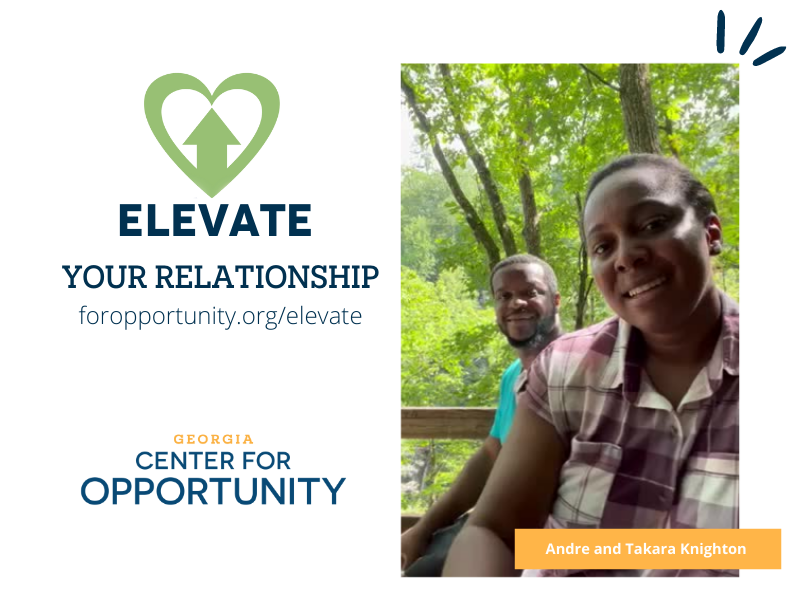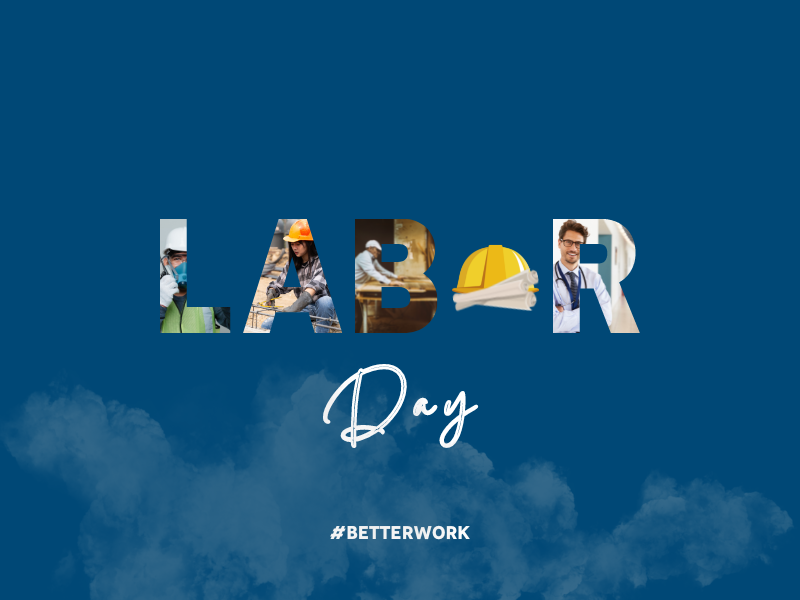
Q&A: Andre and Takara explain how GCO’s Elevate class changed their relationship

Q&A: Andre and Takara explain how GCO’s Elevate class changed their relationship
Key Points
- Andre and Takara Knighton have been married for 15 years.
- The couple was facing some challenges in their relationship, and Elevate turned out to be just what they needed!
- Learn more about Elevate at https://foropportunity.org/elevate/
Andre and Takara Knighton stumbled across the Georgia Center for Opportunity’s Elevate relationship enrichment class purely by accident. But it was a wonderful accident! The couple was facing some challenges in their relationship, and Elevate turned out to be just what they needed. Check out this Q&A for more.
Q: Please introduce yourselves – your family background, kids, jobs, school, work, where you live, etc.
We are Andre and Takara Knighton. We have been married for 15 years and produced two beautiful and funny children. We currently live in Georgia but have lived in other states before deciding to reside here. We both have done social work in different fields, but after the pandemic we decided to focus more on our multimedia company, Vizion Image Media.
Q: How did you first learn about Elevate?
Takara learned about the program randomly at a county office. She was registering the car tags and while she was waiting saw a flier for Elevate. So she went home and started researching more about it.
Q: What prompted you to want to attend Elevate?
We were in a tight spot in our relationship. We had been allowing little things to bother us and had been a little distant from one another. We kind of lost ourselves in just life and slowly began to lose our friendship. So when Takara saw this flier and did her research on the program, we decided to just go for it. We went with expectations to try something new and honestly have set dates for ourselves that would also be a building block for our relationship.
Q: What was your experience like in the class? What did you learn?
The class was eye opening. We saw couples who had been married for 20 years to newly married couples that also had the same stories. It was encouraging to know that there are couples—especially couples married longer than us—that just needed a little extra help to learn to reconnect. We learned how to look at each other again, but in a new light. The major thing we learned is how to stop and refocus our negative thoughts back to the positive. Sometimes when you have been with someone for so long you tend to focus on all the negative attributes of the person instead of the good qualities that brought you two together. Also, you forget to tell your spouse how much they mean to you and remind them of why you feel in love. Now we are telling each other almost two to three times a week what we appreciate about one another.
Q: Of the seven core relationship skills and qualities for success, which one did you find most impactful for your own relationship?
Definitely “Enlighten.” We weren’t dealing with each other in a healthy manner because we only focused on the past. We forgot that people can change and likes and dislikes can change. We still looked at each other as the 20-somethings we used to be. So we had to become enlightened about who our spouse was again. We had to discover our passions and loves separately and apart. We had to be more sensitive to each other’s feelings and listen. We had to rediscover “us.”
Q: What are some reasons you can think of for other couples to attend Elevate?
We believe that everyone should experience this class because it does open your eyes to some questions that you may never have thought to talk about before. You can be married for two years or 25 years and still never think to ask your partner some of these questions. This class allows you to explore a new part of you, and the you in your relationship. People change over time and so does your relationship. So instead of ditching it because you changed, learn how to deal with the new you in your relationship and discover how you both can make the changes work.
Q: What are your future goals and plans?
We plan on dating each other more and trying new things together. We definitely want to travel overseas again and take our kids on their first overseas adventure so they can learn about life and other cultures.



